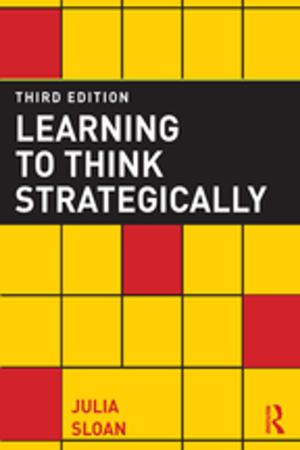Refocusing School Leadership
Foregrounding Human Development throughout the Work of the School
Nonfiction, Reference & Language, Education & Teaching, Educational Theory, Leadership| Author: | Robert J. Starratt | ISBN: | 9781136916403 |
| Publisher: | Taylor and Francis | Publication: | September 13, 2010 |
| Imprint: | Routledge | Language: | English |
| Author: | Robert J. Starratt |
| ISBN: | 9781136916403 |
| Publisher: | Taylor and Francis |
| Publication: | September 13, 2010 |
| Imprint: | Routledge |
| Language: | English |
Refocusing School Leadership departs from the more traditional conceptualization of leadership, looking behind the daily routines of human resource leaders to highlight the assumptions and values and beliefs they bring to their work as well as the values and meanings embedded in the various contexts of school life. Starratt explores how educational leadership is grounded in one’s own humanity as well as in a deep appreciation of the richness, complexity, and enormous potential of people, and he attempts to restore the centrality of human development in the work of educating the young—education is not simply about educating minds, but about developing whole persons. Starratt argues for a refocusing of educational leadership on affirming and enabling those talents, dispositions, interests, life experiences, and cultural proficiencies that comprise their humanity to enrich the work of learning.
The vision of the school should speak of the extraordinary possibilities for human achievement in our young people, as well as the talents of their teachers to nurture those possibilities. Starratt’s focus on leadership as human resource development will energize the efforts of faculty, staff, and students to improve the quality of learning—the primary work of schools. This book is a valuable resource to prepare aspiring leaders, whether administrators or teachers, to deal with the way schools are currently run and to imagine and create better ways to promote quality learning for all.
Refocusing School Leadership departs from the more traditional conceptualization of leadership, looking behind the daily routines of human resource leaders to highlight the assumptions and values and beliefs they bring to their work as well as the values and meanings embedded in the various contexts of school life. Starratt explores how educational leadership is grounded in one’s own humanity as well as in a deep appreciation of the richness, complexity, and enormous potential of people, and he attempts to restore the centrality of human development in the work of educating the young—education is not simply about educating minds, but about developing whole persons. Starratt argues for a refocusing of educational leadership on affirming and enabling those talents, dispositions, interests, life experiences, and cultural proficiencies that comprise their humanity to enrich the work of learning.
The vision of the school should speak of the extraordinary possibilities for human achievement in our young people, as well as the talents of their teachers to nurture those possibilities. Starratt’s focus on leadership as human resource development will energize the efforts of faculty, staff, and students to improve the quality of learning—the primary work of schools. This book is a valuable resource to prepare aspiring leaders, whether administrators or teachers, to deal with the way schools are currently run and to imagine and create better ways to promote quality learning for all.















